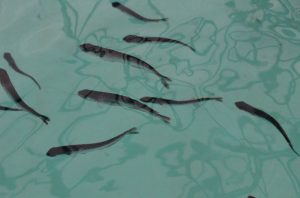Smithsonian Highlights Research Showing How Fish Get Risky Around Oil
– NOVEMBER 28, 2017
The Smithsonian recently published an article that included research, funded by the Gulf of Mexico Research Initiative (GoMRI), that investigated the behavior of fish larvae around oil. The referenced study is of particular interest because the amount of oil used in exposure experiments were at levels recorded in industrialized sections of tropical coral reefs worldwide.
Read the article Fish Get Risky around Oil to learn more about altered fish behavior and growth in the presence of oil, including exhibiting reduced ability to take shelter in a healthy reef and reduced seeking safety in numbers.
************
GoMRI and the Smithsonian have a partnership to enhance oil spill science content on the Ocean Portal website.
This research was made possible in part by a grant from BP/The Gulf of Mexico Research Initiative (GoMRI) to the Relationships of Effects of Cardiac Outcomes in fish for Validation of Ecological Risk (RECOVER) consortium.
The GoMRI is a 10-year independent research program established to study the effect, and the potential associated impact, of hydrocarbon releases on the environment and public health, as well as to develop improved spill mitigation, oil detection, characterization and remediation technologies. An independent and academic 20-member Research Board makes the funding and research direction decisions to ensure the intellectual quality, effectiveness and academic independence of the GoMRI research. All research data, findings and publications will be made publicly available. The program was established through a $500 million financial commitment from BP. For more information, visit https://gulfresearchinitiative.org/.
© Copyright 2010-2017 Gulf of Mexico Research Initiative (GoMRI) – All Rights Reserved. Redistribution is encouraged with acknowledgement to the Gulf of Mexico Research Initiative (GoMRI). Please credit images and/or videos as done in each article. Questions? Contact web-content editor Nilde “Maggie” Dannreuther, Northern Gulf Institute, Mississippi State University (maggied@ngi.msstate.edu).






